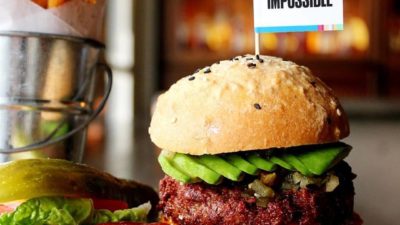An Old man and the Sea – Viva!life 77
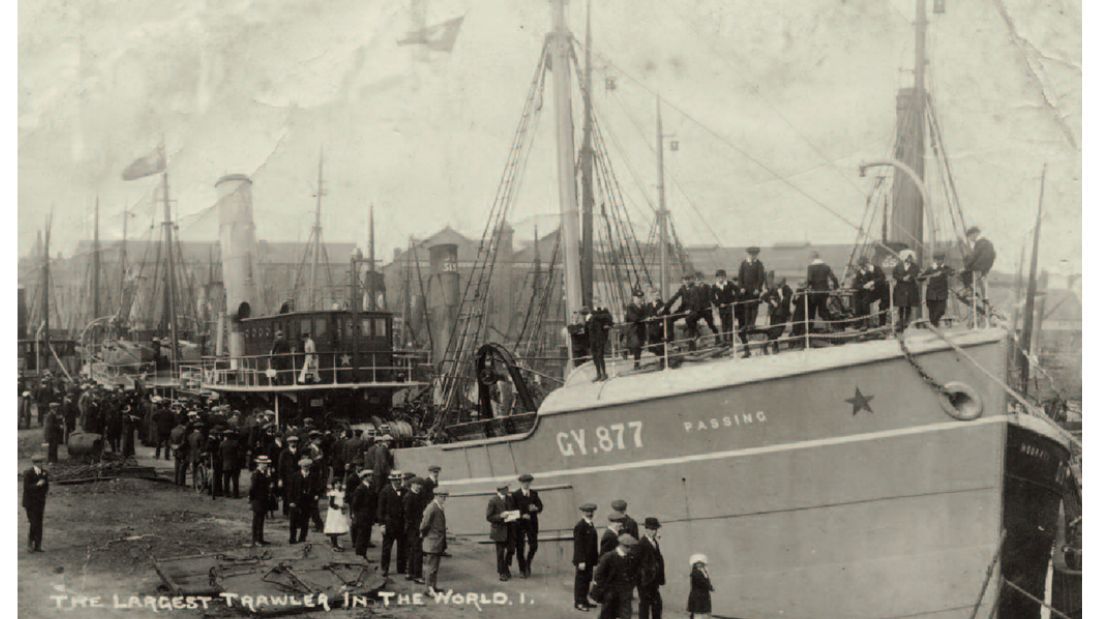
Tony Wardle takes stock of humankind’s relationship with the sea – how it was,
how it is and how it has to change
Featured in Viva!Life 77/Summer 2021
Funny old place Grimsby. Comedians love the name and when you tell someone you come from there you can almost see a little flicker of sympathy flit across their eyes, despite them never having been there.
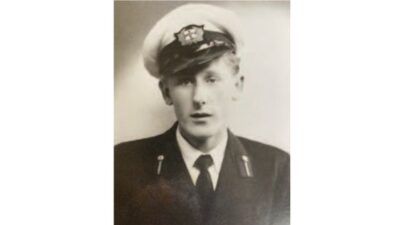
Midshipman Tony Wardle aged 17
Sacha Baron Cohen certainly had great fun with it in his movie Grimsby, even if it was filmed in Essex. You can’t go to Grimsby on the road to somewhere else like you can call in at Nottingham on your way to Sheffield as it’s stuck out on its own on the bulge of North Lincolnshire, on the estuarial bank of the River Humber.
It’s the end of the line – in more ways than one, some would say. Fish, that’s what it‘s famous for – fish and Grimsby go together like… well, certainly not peaches and cream but it’s where I grew up in the 40s and 50s (yes, I am that old).
I was part of a community that was held together by the gravitational pull of fish and fishing. It was the principal employer, the inescapable, all-pervasive influence whose connective threads bound everyone captive in a tapestry of mutual interest and understanding.
In our alley, my next-door neighbour Carl Jorgensen skippered a Seine netter, named after his baby daughter Marcia, and his sons – my friends Johnnie and Tommy – would also eventually go to sea, Johnnie joining his dad on the Marcia.
Mister Over on the other side worked on the docks. On warm days, Mrs Rowbottom would sit out in her back yard braiding nets. And across the road lived the blonde, willowy and beautiful Greta Sorensen, who I worshipped from afar, and whose father was also a Seine net skipper.
There were mornings when I was awakened in the wee small hours by the clank clank clank of clog irons striking pavement stone as lumpers – catch handlers – made their way to work.
Decades earlier, my own miserable grandfather, John ‘Sparrow Jack’ Wardle, had worked on the docks for the wonderfully named The Great Grimsby Coal Salt and Tanning Company Ltd (still there but now called just Cosalt), devising ways of preventing oil navigation lamps from sooting up in heavy weather and other inventions.
Our street was a featureless Victorian terrace and it ended at the railway lines that ran atop a high bank that kept the sea at bay – well, until the 1953 East Coast flood disaster when it ignored all obstacles and came crashing over.
On the corner of the street was the Bethel Mission, my Sunday school and the fishermen’s church. Its stained glass windows featured some vessels that had been lost at sea, the pulpit was a ship’s binnacle that had once housed a compass and every service ended with the hymn For those in peril on the sea, always sung at full volume with heart-felt meaning.
And in peril they were. Most lost fishermen were just that – lost. But from one vessel that went down they recovered eight bodies and as usual their funeral services were held at the Bethel Mission.
Oh what a dreadful sight it was that moistened the eyes and chilled the soul, as eight hearses moved slowly down our street, each preceded on foot by a black-clad undertaker and each followed by a cortege of wives and children, mothers and fathers, leaning on each other for support as their unrestrained tears flowed; each now facing the reality of a potential event they had always dreaded but had tried to ignore.
One hearse after another passed slowly by in a seemingly endless train of human misery while we and other residents of the street stood silently on our doorsteps out of respect, as was the way – some with loved ones still out there on the sea.
Life at sea was brutal. A tiny, cramped and overcrowded space that was never motionless; sleep obtained in short snatches; working often in sub-zero temperatures with gutting gloves that froze solid, until the cook delivered buckets of hot water for hands to be dipped in to thaw; and the regular cry of “Water” that sent crew scrambling into the lea of the forepeak as solid green sea water came crashing over the bow.
They would be away for up to three weeks, two days at home and then away again, their money linked to the profitability of the catch. During their absence at sea, wives would queue at the dock offices for a sub against their bloke’s meagre earnings, to keep them going.
A poor catch would mean the men ‘paid off’ in debt – owing the company money despite what they’d endured. Apart from a few skippers, fishermen were not rich. But… when education was centered more on the cane than learning, when job opportunities were scarce and when you could wrap yourself in the warm cloak of tradition that offered you some pride and a measure of respect, of course lads went to sea.
In my father’s day there were over 700 vessels sailing out of Grimsby and an almost similar number from Hull, their bitter rival across the river. In my childhood, the quantity had reduced to about 170 but bigger, more destructive and further reaching.
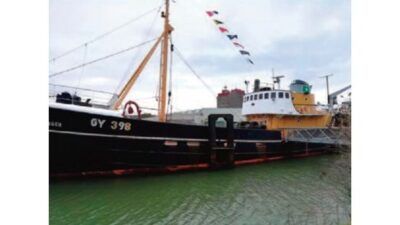
Above: The Ross Tiger is typical of 1950/60s trawlers. It is now open to the public as part of the Grimsby Fishing Heritage Centre and well worth a visit to understand the town’s old fishing culture
It still enabled Grimsby to proclaim itself as the biggest fishing port in the world. Smaller vessels headed for the Dogger Bank in the middle of the North Sea while distant-water trawlers ploughed the seas off the Faroe Islands, Norway and Iceland, with bigger vessels heading up to the Arctic circle and beyond.

Are you enjoying this article?
This piece was originally published in Viva!life, our exclusive quarterly magazine for Viva! members. Viva!life features editorials on our latest campaigns and investigations, exclusive celebrity interviews, ethical businesses, health news, plant-based cookery, and vegan trends.
By joining Viva! for as little as £1.50 a month, you will get Viva!life magazine delivered straight to your door four times a year, so you can be the first to read our new features — as well as lots of other great benefits!
Most were trawlers and their huge and heavy trawl boards kept the mouth of the nets open to scoop up fish and in the process, remorselessly ploughed the sea bed and all its unwanted creatures into oblivion. Collectively, they brought back fish in such huge quantities that a class of railway locomotive was designed especially to service the trade.
Known as LNER B5 Fish Class, 14 were built to ferry the iced fish (no freezing in those days) to London and other big cities. Sometimes the market was glutted with fish and trawlers discharging at times like that got nothing for their catch no matter how big, which was ferried down the road to Fison’s fertilizer factory at Pyewipe.
Thousands of animals slaughtered for nothing. Even then there were a few quiet voices warning of the irresponsibility of plundering the seas with such abandon but they were lost in the clamorous arguments about need and employment and tradition.
So where am I going with this? It isn’t just a trip down memory lane but an attempt to offer an understanding of why people do what they do to our planet, who ultimately bears responsibility and what we can do about it.
The ones who do the dirty work, the catching and killing, often have deeply precarious lives and are themselves exploited along with the fish.
Trawler owners had never thrust a filleting knife into a writhing, living cod in sub-zero temperatures and investors had no concerns over what happened to the people, animals or the environment so long as the returns on their investment were regular and generous.
They were the conductors of this destructive orchestra, their rewards and their loyalty trumping all other considerations in the eyes of the owners. It was a pyramid of extortion that served capitalism well – and still does.
Little has changed except that the exploitation has intensified, the greed has become more rapacious and the damage has multiplied. The fishing centre of gravity has moved away from Grimsby but all across the world there is an unbridled assault on every possible fishable stretch of water.
The scale of this warfare, for that is what it is, is brought into terrifying focus through the camera lens of the brilliant young film maker, Ali Tabrizi. His 90-minute documentary, Seaspiracy, manages to peer beneath the surface in more ways than one.
Ali’s investigative reporting leads through almost every aspect of oceanic and fish farm exploitation with some astounding figures, such as five million fish caught every minute. With some extraordinary footage, he exposes the clandestine smuggling of countless shark fins and the industrial hoovering up of the oceans’ wildlife.
Big environmental organisations are exposed for their cowardice in failing to tackle this catastrophic tragedy (just like the reticence they exhibited with meat). You have the excruciating, toe-curling attempt by an outfit that certifies some fish as ‘sustainable’ to provide a coherent definition of what constitutes ‘sustainable’.
It transpires that they rely on the log entries of fishing boat skippers as to the amount of bycatch they have or haven’t caught and discarded. I interviewed Viva!’s Head of Investigations, Lex Rigby (Viva!life issue 75) who spent seven years at sea with Sea Shepherd and off Liberia had monitored just how reliable this record keeping is.
One vessel they had under observation claimed in its log that one shark had been accidentally caught and discarded. Lex had counted them throwing more than a hundred overboard. Because of oppression in Myanmar, Thailand has a large number of stateless refugees and Ali secretly interviews some who are involved in the fishing trade that provides food for the massive prawn industry.
It is heartbreaking and shameful that these people are virtual slaves, worked almost to death, beaten and even killed and thrown overboard – easy as there are no records of their existence.
There is so much in this film that just has to be seen and I urge you to watch it but the conclusion is stark – despite a plethora of excuses, we have to stop eating fish. My own reminiscences have a sad post script.
Although I moved away from Grimsby it was almost inevitable that I would go to sea. Aged 17, I was preparing to join the merchant ship Freetown, sailing out of Liverpool for West Africa, when I was sent a cutting from the Grimsby Evening Telegraph.
In a few lines it reported that the fishing vessel Marcia had foundered in the North Sea and gone down with all hands. This grey expanse had claimed Carl Jorgensen and his young son Johnnie, my childhood friend, just like it had so many others – some 12,000 or so men and boys who never returned home to Grimsby or Hull over a 100 year period.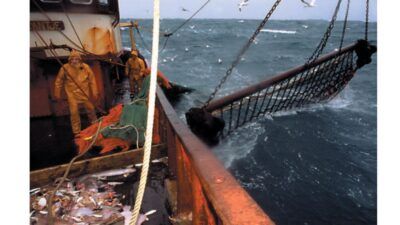

Did you enjoy this article?
This piece was originally published in Viva!life, our exclusive quarterly magazine for Viva! members. Viva!life features editorials on our latest campaigns and investigations, exclusive celebrity interviews, ethical businesses, health news, plant-based cookery, and vegan trends.
By joining Viva! for as little as £1.50 a month, you will get Viva!life magazine delivered straight to your door four times a year, so you can be the first to read our new features — as well as lots of other great benefits!





